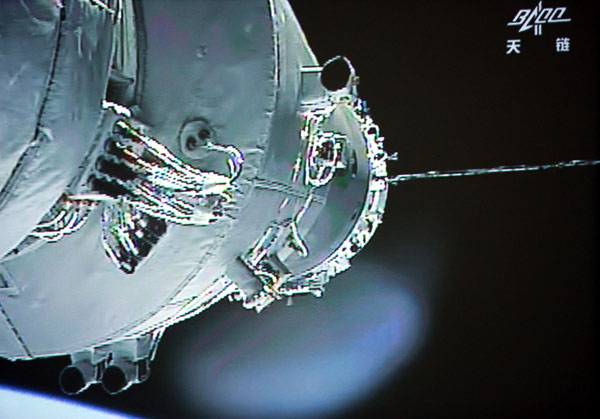

 |
|
Photo taken on June 13, 2013 shows the screen at the Beijing Aerospace Control Center showing the Shenzhou X manned spacecraft conducting docking with the orbiting Tiangong-1 space module. China's Shenzhou X manned spacecraft successfully completed an automated docking with the orbiting Tiangong-1 space module at 1:18 pm Thursday.[Photo/Xinhua] |
BEIJING - China's Shenzhou X manned spacecraft successfully completed an automated docking procedure with the orbiting Tiangong-1 space module at 1:18 pm Thursday, according to the Beijing Aerospace Control Center.
The docking procedure was the fifth to take place between Shenzhou-type spacecraft and the space module. Previous dockings include two automated operations by the unmanned Shenzhou VIII in 2011 and both an automated and manual docking by the manned Shenzhou IX in 2012.
The Shenzhou X, which was launched Tuesday afternoon from northwest China's Gobi desert, began to approach the Tiangong-1 automatically at 10:48 am Thursday and made contact with the space module at 1:11 pm.
Three astronauts aboard the Shenzhou monitored and reported the docking operation to the control center.
According to their mission schedule, the astronauts will enter the space module later and carry out scientific and technical experiments.
The Shenzhou X is China's fifth manned spacecraft and it is the first application-orientated flight under China's space program since the country introduced its manned space program in 1992.
The astronauts are scheduled to conduct a manual docking with the space module during their 15-day journey in space, as well as give a lecture to Earth-bound students.
China is the third country after the United States and Russia to acquire the technologies and skills necessary for space rendezvous and docking procedures, as well as supply manpower and material for an orbiting module via different docking methods.
The Tiangong-1 space lab has been in orbit for about 620 days. It will remain in service for another three months.
The module is considered the first step in building a permanent space station, which the country aims to do by 2020.
Related:
Special: China launches Shenzhou X spacecraft
Space dream on course after launch
China is pursuing its space dream unswervingly, President Xi Jinping said following the successful launch of the Shenzhou X spacecraft on Tuesday.
The Long March 2F carrier rocket with three astronauts — commander Nie Haisheng, astronaut Zhang Xiaoguang and the second Chinese woman in space Wang Yaping — blasted off from the Jiuquan Satellite Launch Center in Gansu province at 5:38 pm on Tuesday.
Astronauts send Dragon Boat Festival greetings
Three astronauts aboard the Shenzhou X spacecraft, which was launched into space on Tuesday, gave Dragon Boat Festival greetings to all Chinese on Wednesday.
This year's festival, which falls on June 12, is the second Dragon Boat Festival to be celebrated by Chinese astronauts in space







